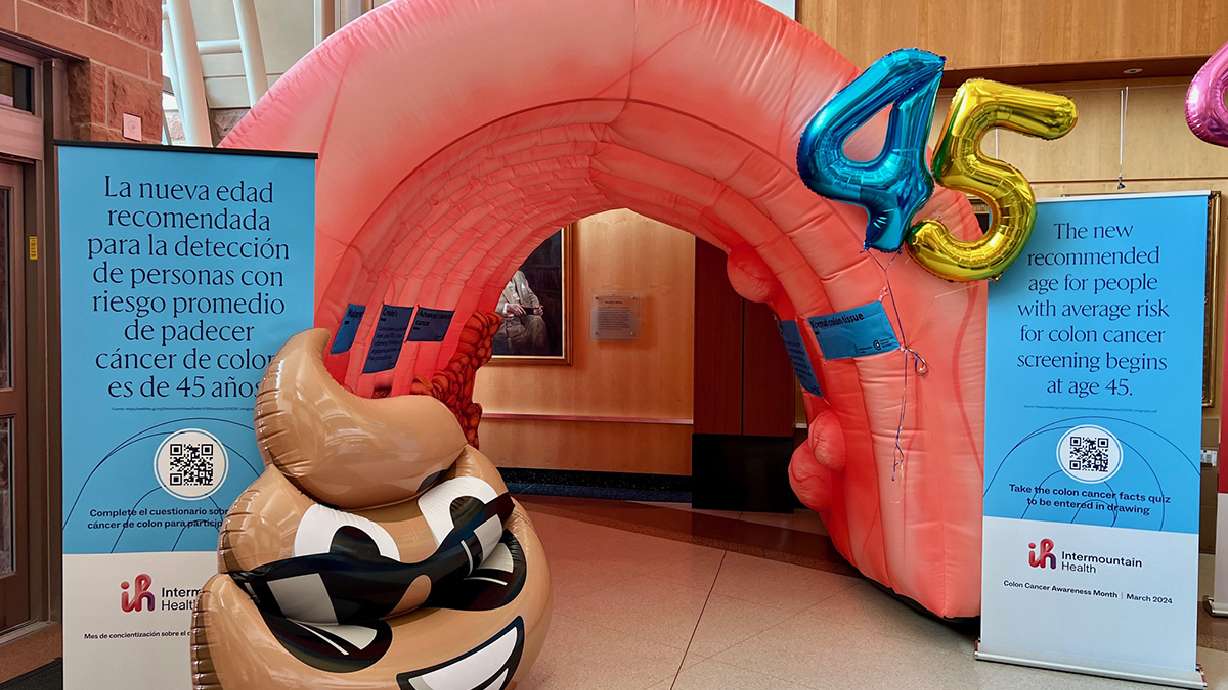Estimated read time: 4-5 minutes
This archived news story is available only for your personal, non-commercial use. Information in the story may be outdated or superseded by additional information. Reading or replaying the story in its archived form does not constitute a republication of the story.
Intermountain Health cancer experts are doubling their efforts to raise awareness about colorectal cancer this month in a unique public awareness campaign called, Let's Get to the Bottom of Colon Cancer.
Two giant inflatable colons — nicknamed Colin and Collette — along with Intermountain cancer experts are traveling to 23 hospitals, clinics, and community centers in Utah and Idaho in 29 days throughout March.
The objective of this interactive campaign is to bring critical awareness about colon cancer and the importance of potentially life-saving screenings in a fun, visual, and hands-on manner, as part of National Colorectal Cancer Awareness Month.
The Intermountain Let's Get to the Bottom of Colon Cancer inflatable colon tour kicked off at Intermountain McKay-Dee Hospital in Ogden on March 1.
This is the second year for this unique public awareness tour, which is a unique opportunity for the public to walk through 12-foot, 113-pound inflatable colons. They depict different stages of colorectal cancer, starting with the earliest stage of a precancerous colon polyp.
The two giant inflatable colons will continue to crisscross Utah and Idaho for various events throughout March.
"This tour is an opportunity to spread awareness across our communities to help our patients and their families learn about the importance of knowing their colon cancer risk and then moving forward with completing the best screening test for them," Nathan Merriman, MD, medical director of gastroenterology and digestive health at Intermountain Health said. "Colon cancer is preventable, treatable, and beatable. In fact, colon cancer has a 90% survival rate when it's detected early."
The American Cancer Society estimates more than 53,000 Americans will die from colon cancer in 2024, making it the second leading cause of all cancer-related deaths in the United States.
"One alarming trend is the incidence rate of colorectal cancer continues to rise each year in people under the age of 55," Kyle Eliason, MD, gastroenterologist at Intermountain McKay Dee Hospital in Ogden said. "Young people are also often diagnosed with more advanced cancers due to delays in detection, driving home the point that prevention is the best strategy to beat cancer."
Merriman stresses that the goal is to get the public to take control of their health and better understand that individual risk factors, such as a family history of colorectal cancer, inherited genetic disorders, or certain lifestyle choices may increase the likelihood that a person will develop colon cancer.
The only way to detect colon cancer is through screening. Intermountain doctors say people with an average risk of colon cancer should start their screenings at age 45.

A colonoscopy, which is an examination of the inside of the colon, is the most effective method of screening for colon cancer, precancerous growths, and polyps. If an abnormal mass or polyp is identified during the outpatient procedure, the physician will identify the best course of treatment, which may include removing it during the procedure.
"Finding and removing precancerous growths during a colonoscopy can prevent cancer from developing," Merriman said. "Delays in screening could lead to a delayed cancer diagnosis. A screening can really save a life and protect a family. We need everyone's help to work together to prevent colon cancer across our communities."
For the full inflatable colon tour, click here. For more information on colonoscopies, click here.
The opinions and conclusions expressed in this article are the sponsor's own and do not reflect the views or opinions of KSL.com. This Site Does Not Provide Medical Advice. Any content on this Site, such as text, graphics, images, information obtained from, or contained on this Site are for informational purposes only. The content is not intended to be a substitute for professional medical advice, diagnosis, or treatment. Always seek the advice of your physician or other qualified health provider with any questions you may have regarding a medical condition. Never disregard professional medical advice or delay in seeking it because of something you have read on this site! The owner and operator of this site do not recommend or endorse any specific tests, physicians, products, procedures, opinions, or other information that may be mentioned on the site. Reliance on any information provided by the Operator, including their employees, contractors or others appearing on the Site at the invitation of the Operator, or other visitors to the Site is solely at your own risk. If you think you may have a medical emergency, call your doctor or 911 immediately.









